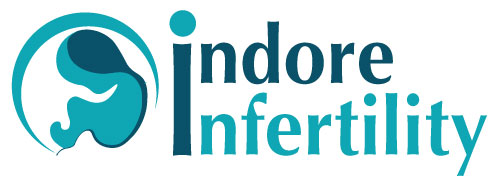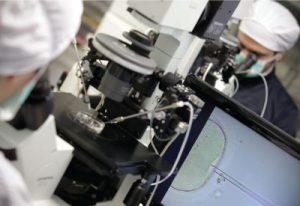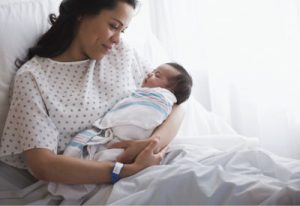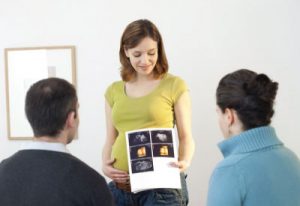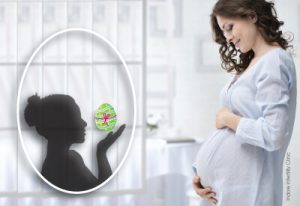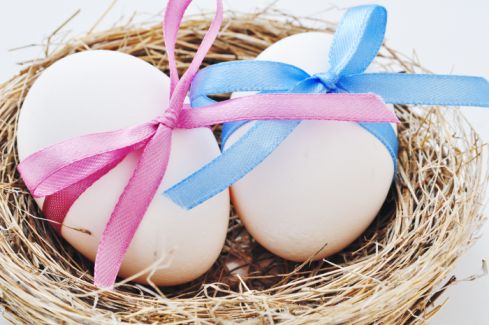
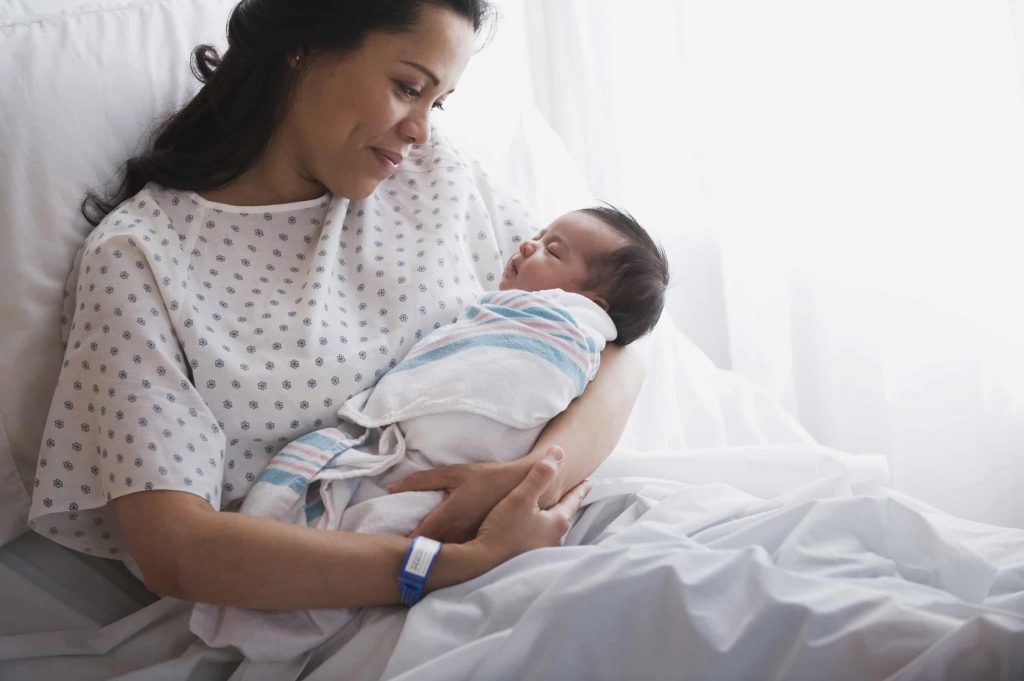
What is the Donor Egg Program?
Egg donation is a fertility treatment where a woman, known as the donor, provides her eggs to help another individual or couple conceive a child. These donated eggs are typically used in IVF procedures, where they are fertilized with sperm in a laboratory and then implanted into the recipient’s uterus. This process offers hope to individuals or couples facing infertility issues, allowing them to experience pregnancy and childbirth. It’s a generous and life-changing act that brings the gift of parenthood to those in need.
When is Donor Egg recommended?
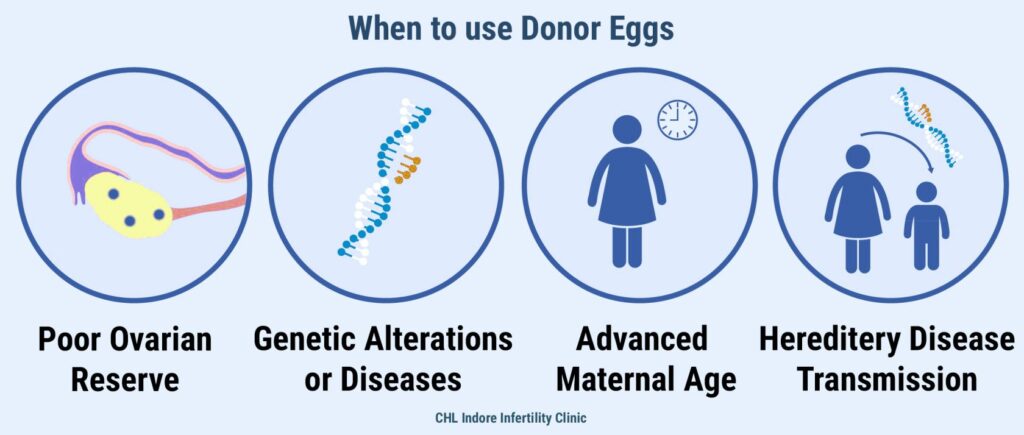
Egg donation is needed for patients who either have no or few eggs, or who based on previous failed treatments have eggs that are of poor quality. Most commonly this is due to premature menopause, menopause or advanced maternal age.
The primary indication for egg donation was originally for women with premature ovarian failure (POF), defined as menopause occurring before the age of 40 years. POF affects approximately 1% of the female population; in effect, this condition indicates depletion of a woman’s own eggs and cessation of ovarian function. Other potential candidates for egg donation include:- Women who have previously failed multiple IVF attempts, particularly when poor egg quality is suspected, and women carrying transmittable genetic abnormalities which could affect their offspring (this latter indication has declined with the development and use of pre-implantation genetic diagnosis, or PGD).
- Women with very poor egg reserve ( typically women in their late thirties) indicated by low AMH.
- Women with multiple failed IVF Cycles due to poor quality of eggs and resulting embryos.
- Post Cancer treatment, if female did not undergo Fertility Preservation before starting chemotherapy.
- Rare cases of genetic disease in women , where she is born without Ovaries.
How is the process of IVF with Egg Donation done?
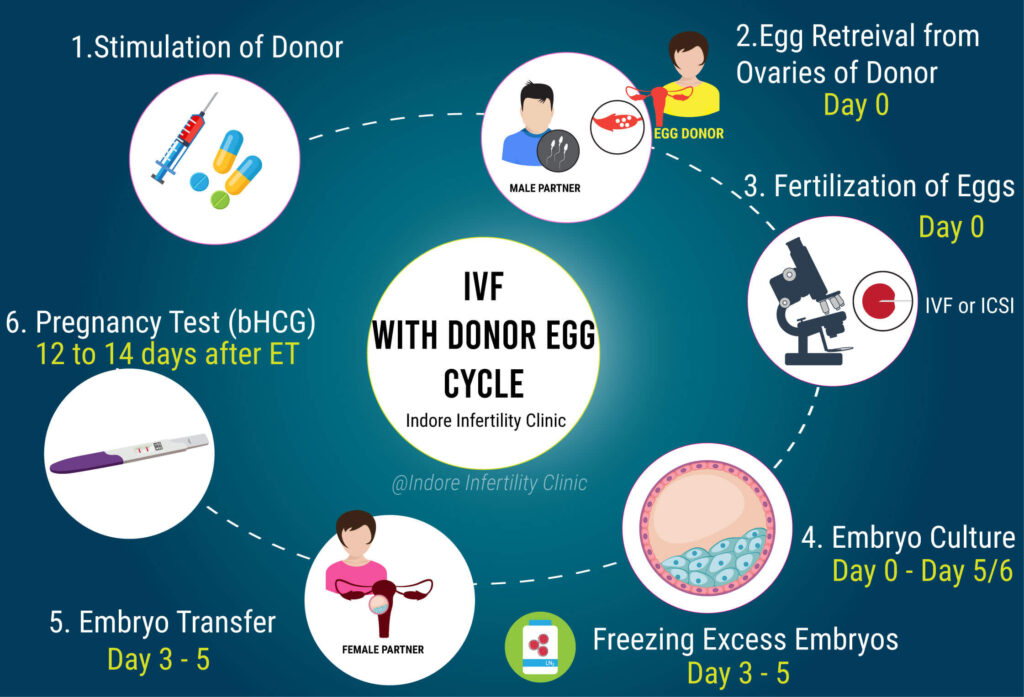
During an IVF Cycle with Egg donation, the Egg donor is stimulated so that her ovaries produce multiple eggs. On the day of Ovum Pickup, the male partner provides his sample so that the retrieved donor eggs can be fertilized with his sperms.
The female partner is given medication to prepare her endometrium lining for undergoing Embryo Transfer during this cycle. Depending on the stage of embryo, the Embryo Transfer will occur 4 to 6 days after the Donor oocyte retrieval.
Steps for Female Partner
Be ready to undergo several ultrasound monitoring for assessment of your endometrial thickness.
Female partner will NOT be injected with daily IVF injections for producing follicles.
Female partner will NOT be undergoing Ovum Pickup or egg retrieval process of an IVF cycle.
Female partner will be prepared for IVF Embryo Transfer.
Steps for Male Partner
For Male partner the steps are same as regular IVF cycle. He will need to provide sample once for cryopreservation before the Donor Egg retrieval and once on the day of Donor egg retrieval if required.
How is the IVF with Egg donation cycle matched with Embryo Transfer ?
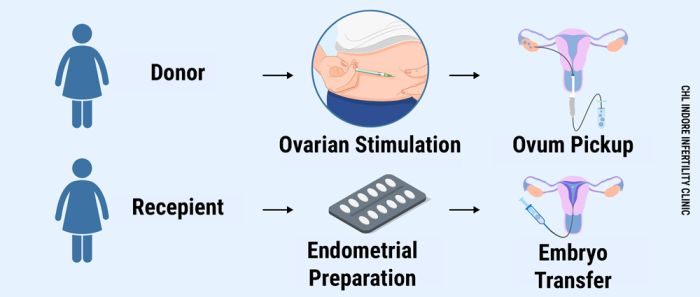
THE EGG DONATION PROCESS CONSISTS OF TWO PHASES.
Ovarian Stimulation
In the first phase, Ovarian Stimulation, donors receive a series of hormonal drugs which cause the ovaries to produce multiple mature eggs during one menstrual cycle.
Egg Retrieval
During the second phase, egg retrieval, mature eggs are removed from the donor through a surgical procedure called Transvaginal ultrasound Aspiration. Using a tube attached to an ultrasound probe, a physician guides a suctioning needle into each ovary and removes mature oocytes from the follicles. A medication such as oral promethazine may be used to prevent nausea during the procedure. Following egg retrieval, donors generally remain in the clinic for 1-2 hours and then return home for further recovery. An antibiotic such as oral doxycycline will be prescribed to prevent infection, and donors should undergo a follow-up exam and ultrasound one week after the retrieval.
Advantages of Donor Eggs
Because donor eggs come from young and fertile women, success rates for donor-egg IVF can be as much as two or three times higher than with regular IVF in women ages 40 and older.
Also for females who cannot produce an egg due to Premature Ovarian Failure, Donor eggs give them a chance to become pregnant and breast feed like any other mother would.
Donor Eggs involve fertilization using your Husband’s sperms, hence making the child 50% genetically related to the couple.
Risks involved
The risks to the donor are considered to be minimal and short-term. Risks include the possibility of small amount of bleeding or pelvic infection (less than a 1% chance). Equally, there is a 1% – 2% risk of excessive ovarian stimulation (too many eggs being produced) despite careful monitoring. In such a case, the donation cycle will probably be abandoned and treatment would be commenced to regularize your menstrual cycle.
What is the Success Rate of IVF with Donor Eggs
The success rate of IVF with Donor Eggs depends on multiple factors.
Typically with donor eggs and embryos, you’ll have about a 60 percent chance of giving birth to a child.
What are the factors affecting success rate of IVF with Donor Egg ?
Ironically, the most important factor that impacts the success rate of IVF cycle with Donor Eggs is the quality of the Donor eggs.
Donors are usually females who are much younger in age and have had healthy children before. However even with the best intention in mind, IVF Clinics cannot foresee the quality of egg that will be retrieved from the donor during an IVF Cycle. Sometimes the egg quality is not optimum and this may result in poor quality of Embryos.
If you are undergoing IVF with Donor eggs and the quality of the Embryos is not optimum, you may ask the IVF Clinic to recruit another donor so that only a healthy and good quality embryo is transferred. This will add upon to the Donor cost, but it will ensure high rates of success.
Another factor that impacts the quality of embryo formed is the IVF lab capabilities. If the IVF Lab environment is not upto date, then the resulting embryo may be impacted. Unfortunately there is no way to know the IVF Lab capabilities from outside. A good Embryologist usually gives the best IVF success rate at any IVF Lab. So if in doubt, request meeting with the Embryologist.
What is the cost of IVF with Donor Egg or Donor Oocytes?
The cost of Donor eggs varies largely between clinics. The cost is completely dependent on availability of oocyte donors that match your profile. However at our Clinic we have tie up with registered ART Banks who have a quick turn around time in providing oocyte donors.
The cost of IVF with donor eggs is usually high because of the following factors that add upon to the cost:
- Compensation given to the egg donor.
- Cost of medical Insurance coverage for egg donor.
- Cost of medical evaluation of egg donor including hormonal / genetic profiling.
- Legal fees for affidavits and other legal processing for egg donor and recipient parents.
- Processing and Cycle coordination fees for synchronizing an IVF embryo transfer with Donor cycle.
All these factors add up to the cost of an IVF cycle with Donor eggs.
A donor egg cycle will typically cost around INR one hundred thousand ( 1 Lacs) more than a standard IVF ICSI Cycle.
You might want to read
